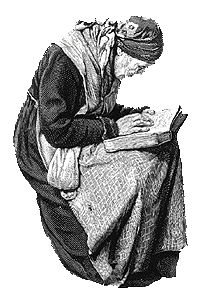
Women, Culture, and Power
 To the extent that culture consists of "the learned behaviors of a given human society," women and men figure equally in the cultural system. However, the cultural "template" of which we speak in the baseline definition of culture is constantly being negotiated, revised, and reproduced, and the power to participate in this process of negotiation has historically been divided along gendered lines. As a result, we cannot read a discussion of culture by, say, Matthew Arnold, without inquiring about the cultural processes by which Arnold (a wealthy, heterosexual white male) could gain respect for his writing, while contemporary female authors like Mary Anne Evans and Charlotte Brontë had to adopt male pseudonymns in order for their work to be accepted.
To the extent that culture consists of "the learned behaviors of a given human society," women and men figure equally in the cultural system. However, the cultural "template" of which we speak in the baseline definition of culture is constantly being negotiated, revised, and reproduced, and the power to participate in this process of negotiation has historically been divided along gendered lines. As a result, we cannot read a discussion of culture by, say, Matthew Arnold, without inquiring about the cultural processes by which Arnold (a wealthy, heterosexual white male) could gain respect for his writing, while contemporary female authors like Mary Anne Evans and Charlotte Brontë had to adopt male pseudonymns in order for their work to be accepted.
Among the earliest human societies, organized by kinship groups, different types of work were probably allocated to women and men -- food preparation and cooking for women, hunting and building for men, etc. Some scholars have argued that, despite this division of labor, matriarchal kinship groups were the original cultural template among human societies; the Iroquois culture of North America is a famous example of matriarchal culture. While the prevalence of matriarchy in early human society is unknown, evidence does suggest that in many societies family descent was traced through the mother rather than through the father; these societies are described as "matrilineal."
In historic times, however, most dominant world cultures have been patrilineal, although some examples of matriarchy/matrilineality can be found. The vast majority of these dominant cultures have systematically limited the power of women in their social, political, and religious institutions. And, while dramatic progress in women's rights has been made since World War II in some countries, women continue to be under-represented politically, under-compensated economically for equal work (as compared to men), and restricted in many major religions from access to positions of authority.
In the pages that constitute this fundamental learning topic, we are responding to a complex question: "What is culture?" This reminder about imbalances of power distribution among females and males is not part of the answer. Rather, we should see it as a fundamental part of the process of inquiry. Often when we fail to speak of gender, it is because we are speaking of the masculine gender -- the gender in such a case is assumed: "Political power in Medieval England was concentrated in the hands of wealthy." Do we take this to imply that wealthy women held the reigns of political power? No, of course not. We would normally identify gender in this statement only if the power was where we would expect it not to be: that is, with women. We can't ask "what is culture?" then, without also asking who has the authority to answer that question. And we must ask of any answers, of any positions in regard to culture and culture-formation, "what are the implications of this answer for the distribution of authority between genders?
U.S. citizens and residents live in a country which, for more than half its history, prevented women from voting in public elections. If progress has been made in the seventy-five years since women won the right to vote, it is because critical questions have been asked about U.S. culture and because many poor answers have been challenged. We hope that you'll find in these pages tools which are useful as you participate in this process -- and we hope that you'll use those tools to challenge answers, here and elsewhere, that you find unsatisfactory.
Related Links:
 go back to What Is Culture? page
go back to What Is Culture? page
 To the extent that culture consists of "the learned behaviors of a given human society," women and men figure equally in the cultural system. However, the cultural "template" of which we speak in the baseline definition of culture is constantly being negotiated, revised, and reproduced, and the power to participate in this process of negotiation has historically been divided along gendered lines. As a result, we cannot read a discussion of culture by, say, Matthew Arnold, without inquiring about the cultural processes by which Arnold (a wealthy, heterosexual white male) could gain respect for his writing, while contemporary female authors like Mary Anne Evans and Charlotte Brontë had to adopt male pseudonymns in order for their work to be accepted.
To the extent that culture consists of "the learned behaviors of a given human society," women and men figure equally in the cultural system. However, the cultural "template" of which we speak in the baseline definition of culture is constantly being negotiated, revised, and reproduced, and the power to participate in this process of negotiation has historically been divided along gendered lines. As a result, we cannot read a discussion of culture by, say, Matthew Arnold, without inquiring about the cultural processes by which Arnold (a wealthy, heterosexual white male) could gain respect for his writing, while contemporary female authors like Mary Anne Evans and Charlotte Brontë had to adopt male pseudonymns in order for their work to be accepted.
 go back to What Is Culture? page
go back to What Is Culture? page